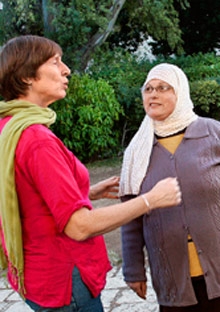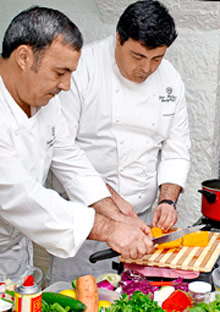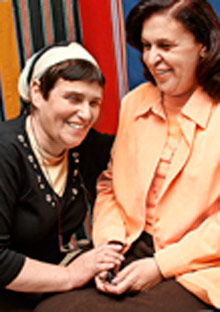
Photo: Debbie Zimelman
In the most unlikely of weight loss groups, 14 women—Israelis and Palestinians—drop pounds, lose inches, and together gain immeasurable humanity. Dina Kraft sits in.
I want to feel comfortable with my body.""I want to feel more confident."
"I want to lose weight."
Suha Khoury reads aloud from slips of paper that have been written on and tucked into a plastic cup by the women now sitting in a circle on name-tagged chairs. They've gathered in a school classroom, festooned with student artwork, for the first meeting of a ten-session weight loss group. Strangers still, they cast their eyes downward, offering only shy, brief exchanges.
Khoury, the group dietitian, continues pulling slips of paper from the cup, reading each woman's goals in staccato succession. Then she gets to one note and takes a breath: "I want to get to know Palestinians." An attendee shifts in her seat, another clenches her jaw.
The fact that these 14 Israeli and Palestinian women have shown up at a school in Jerusalem to support one another—in the everyday fight for slimmer bodies—is in some ways unthinkable. Outside this room, their two peoples are engaged in a much bigger war—one that has been raging for nearly a century, with no end in sight.
The women are part of Slim Peace, a program started by Yael Luttwak, a 36-year-old American filmmaker who is also a citizen of Israel and now lives in London. Using the common denominator of weight—and women's near-universal anguish over it—as a way to bridge deep political, cultural, and religious divides, the project's sixth group will meet for ten two-hour sessions. The idea came to Luttwak about nine years ago when historic peace efforts between Israel and the Palestinians completely collapsed. At the time she had managed to drop a few pounds through Weight Watchers and remembers thinking, "Ariel Sharon is very overweight, and Arafat is not thin either. If they lost weight together, maybe they'd be in a better mood and make better decisions."
It took six years for Luttwak to organize the first group of women, and they became the subject of her 2007 documentary, A Slim Peace (you can see it on Sundance Channel June 15). Supported by the Charities Advisory Trust in London, the program selects candidates (through word of mouth and SlimPeace.org) based on interviews to determine whether they are open and expressive, and asks them to pay a nominal fee of about $50. To date, the groups have combined women who often reside only blocks away from each other but nevertheless live in entirely separate worlds. "I've been struck by what little opportunity they have even to speak with one another before we bring them together—and by how, within just a few hours, they find similarities," Luttwak says. "It's always heartbreaking and hopeful for me."

Photo: Debbie Zimelman
For their initial meeting in October, the women of group six navigate the narrow streets and alleyways of Jerusalem to Prophets Street, near the de facto seam between the traditionally Arab east side where the majority of Palestinians live and the predominantly Jewish Israeli western neighborhoods. Most of the participants live in Jerusalem, although in other groups some have traveled from the West Bank—where the Palestinians must obtain special permits to cross through Israeli roadblocks. As they near their destination, the women follow a milky limestone wall, push open a heavy green iron gate, and enter a cloistered garden oasis on the grounds of a private school. There, amid purple bougainvillea and tangerine trees where Lawrence of Arabia once sipped afternoon tea, they find refuge.
After writing down their goals for the course, they play a quick icebreaker game, standing shoulder to shoulder and tossing a ball to one another as they call out their names. Khoury, who is codirector of Slim Peace and fluent in English and Hebrew as well as her native Arabic, always works with an Israeli facilitator. "This is not a Palestinian program. It's not an Israeli program. It's a program by women and for women," Khoury says, reminding them that they are now on neutral ground.
Next she instructs everyone to jot down a story that relates to food and tell it to the person sitting next to her; that woman will then share it with the group. "'I eat when I'm anxious. Especially chocolate,'" says Pearl Landsman, 62, an Israeli artist and holistic healer, relaying the words of Palestinian Hadil Mussa.
Mussa's dark brown eyes are fixed firmly on the floor as Landsman speaks for her. When she looks up around the circle, women nod and send her encouraging smiles. She smiles back.
Khoury then gives a talk about the value of whole grains and the challenges of social eating. Both societies, she says, suffer from rising rates of obesity. In the Palestinian diet, whole-fat dairy products, shawarma, and oriental sweets tend to be fattening. For Israeli women, high-calorie snacks and heavy family meals over the Sabbath can add on the pounds. But like women everywhere, this group is dealing with issues that cut deeper than calorie control. "Especially for the Palestinians, there is social pressure now to be thin, and many women are devastated," says Khoury. "Some are getting verbal abuse from their husbands or are on the verge of divorce because they cannot lose weight."
Leaving the first meeting, Shoshana Aharoni, 62, a soft-spoken retired nursery school teacher whose parents both lost family in the Holocaust, stumbles on a step and bruises her leg. Three of the Palestinian women rush to assist her. "They took me home in their car—to come to a Jewish neighborhood, no less—and it was hard to say goodbye," Aharoni says later. "Here they were, three Palestinian women, and I thought on the one hand I should feel afraid of them. It was a very special experience."
Such simple but profound moments punctuate the sessions as they unfold with weekly weigh-ins (accompanied by collective groans) and the turning in of food diaries for Khoury's feedback. Mussa decides to cut out all sweets. Pearl Koelewyn, 53, an Orthodox Jew and mother of five, stops using cream in her coffee. In the name of increasing activity levels—and with 10,000 steps a day suggested as a goal—the women have also been given pedometers, which end up becoming a running (if only!) joke.
After writing down their goals for the course, they play a quick icebreaker game, standing shoulder to shoulder and tossing a ball to one another as they call out their names. Khoury, who is codirector of Slim Peace and fluent in English and Hebrew as well as her native Arabic, always works with an Israeli facilitator. "This is not a Palestinian program. It's not an Israeli program. It's a program by women and for women," Khoury says, reminding them that they are now on neutral ground.
Next she instructs everyone to jot down a story that relates to food and tell it to the person sitting next to her; that woman will then share it with the group. "'I eat when I'm anxious. Especially chocolate,'" says Pearl Landsman, 62, an Israeli artist and holistic healer, relaying the words of Palestinian Hadil Mussa.
Mussa's dark brown eyes are fixed firmly on the floor as Landsman speaks for her. When she looks up around the circle, women nod and send her encouraging smiles. She smiles back.
Khoury then gives a talk about the value of whole grains and the challenges of social eating. Both societies, she says, suffer from rising rates of obesity. In the Palestinian diet, whole-fat dairy products, shawarma, and oriental sweets tend to be fattening. For Israeli women, high-calorie snacks and heavy family meals over the Sabbath can add on the pounds. But like women everywhere, this group is dealing with issues that cut deeper than calorie control. "Especially for the Palestinians, there is social pressure now to be thin, and many women are devastated," says Khoury. "Some are getting verbal abuse from their husbands or are on the verge of divorce because they cannot lose weight."
Leaving the first meeting, Shoshana Aharoni, 62, a soft-spoken retired nursery school teacher whose parents both lost family in the Holocaust, stumbles on a step and bruises her leg. Three of the Palestinian women rush to assist her. "They took me home in their car—to come to a Jewish neighborhood, no less—and it was hard to say goodbye," Aharoni says later. "Here they were, three Palestinian women, and I thought on the one hand I should feel afraid of them. It was a very special experience."
Such simple but profound moments punctuate the sessions as they unfold with weekly weigh-ins (accompanied by collective groans) and the turning in of food diaries for Khoury's feedback. Mussa decides to cut out all sweets. Pearl Koelewyn, 53, an Orthodox Jew and mother of five, stops using cream in her coffee. In the name of increasing activity levels—and with 10,000 steps a day suggested as a goal—the women have also been given pedometers, which end up becoming a running (if only!) joke.

Photo: Debbie Zimelman
It's December 3, the seventh session. And the women are agitated. The day before, just a few blocks away, a Palestinian man was stabbed—a grim reminder of the violence that plagues the city. Jaffa Road, which runs parallel to Prophets Street, has seen its share of exploding buses. And terrorists have started plowing bulldozers into cars and pedestrians as a weapon of attack.
Once settled in the cocoon of their classroom, the women relax. By now they are greeting each other with warm hellos, standing closer together and clasping each other's hands as they inquire about work, health, and children. At one point, sitting down in a circle again, they discuss the relationship each had with food as a girl. Koelewyn speaks about her overweight mother, who took diet pills, making her a "nervous wreck, which she took out on me." Koelewyn blames her mother's behavior for some of her own poor habits, like waiting to eat until she is starving and then tearing into food.
Landsman, the holistic healer, who is known in the group for her warmth and quick smile, says she was sickly as a young child and had no appetite. "But by age 10 I was obese."
Suddenly her low, velvety voice seems to sink an octave: "I have no memories of food," she says. "I am a rape survivor, from my father."
The room falls silent.
"Most of my issues with food are about protection," she continues.
Many of the women have tears in their eyes as they embrace her afterward and ask how she made it through.
As the group gathers for the final session in late January, they can't ignore the political tensions. During the five-week break to observe the Muslim, Christian, and Jewish holidays, war has erupted in Gaza, leaving three Israeli and hundreds of Palestinian civilians dead.
Walking down the path to the school entrance, Koelewyn mentions to another woman that her son was among the Israeli soldiers in the ground invasion of Gaza. The woman, Mis'sada Jaber, a 26-year-old Palestinian, is silent.
Inside, as they take their seats, Khoury tries to ease the tension. "We are experiencing a very painful war, and despite that, you are all here today—a real testament to what we are doing." Lifting some of the heaviness in the room, Landsman pulls out a bag of unbuttered popcorn and passes it around as "preventive medicine." Eventually the charged conversation segues into the swapping of strategies for healthy eating: Have fruit before the ice cream; don't arrive hungry to social events; try chopsticks; eat with your nondominant hand; use small plates. For this last meeting, the women have been asked to come with a symbol of hope. They take turns placing their objects in the center of their circle. Makarem Awad, 49, a Palestinian who works for a UN agency, carefully adds her pearl earrings to the pile of objects, saying softly, "They grow out of the darkness." Selma Braier, 49, an Israeli, plunks down her pedometer, with a toast: "Here's to hopes of reaching 10,000 steps a day." Everyone laughs.
As she has with the other groups she's led, Khoury notes with pleasure how the women have unclenched their fists and begun to see through stereotypes to their own value and shared humanity. "One comes up with beautiful conclusions in the end," she says: "I am more valuable than I thought. I need to dedicate more time to taking care of myself. And 'The other' is not as threatening as I've been led to believe."
When it's time to part, congratulations are given to the women who have lost weight, like Awad (almost 18 pounds) and Mussa (22 pounds), and encouraging words are offered to those who have not. There are hugs, whisperings of good luck, and promises to meet again. Awad is committed to joining a gym. Maureen Rajuan, 59, and two of the Palestinian women make plans to go power walking together.
"What I notice," says Slim Peace founder Luttwak, who hopes to start hundreds of groups—including some in the United States—"is that even if they don't stay in touch, they are forever changed by virtue of having met. They cannot go back as easily and demonize each other. They've become human beings."
Dina Kraft is a freelance journalist based in Israel.
Once settled in the cocoon of their classroom, the women relax. By now they are greeting each other with warm hellos, standing closer together and clasping each other's hands as they inquire about work, health, and children. At one point, sitting down in a circle again, they discuss the relationship each had with food as a girl. Koelewyn speaks about her overweight mother, who took diet pills, making her a "nervous wreck, which she took out on me." Koelewyn blames her mother's behavior for some of her own poor habits, like waiting to eat until she is starving and then tearing into food.
Landsman, the holistic healer, who is known in the group for her warmth and quick smile, says she was sickly as a young child and had no appetite. "But by age 10 I was obese."
Suddenly her low, velvety voice seems to sink an octave: "I have no memories of food," she says. "I am a rape survivor, from my father."
The room falls silent.
"Most of my issues with food are about protection," she continues.
Many of the women have tears in their eyes as they embrace her afterward and ask how she made it through.
As the group gathers for the final session in late January, they can't ignore the political tensions. During the five-week break to observe the Muslim, Christian, and Jewish holidays, war has erupted in Gaza, leaving three Israeli and hundreds of Palestinian civilians dead.
Walking down the path to the school entrance, Koelewyn mentions to another woman that her son was among the Israeli soldiers in the ground invasion of Gaza. The woman, Mis'sada Jaber, a 26-year-old Palestinian, is silent.
Inside, as they take their seats, Khoury tries to ease the tension. "We are experiencing a very painful war, and despite that, you are all here today—a real testament to what we are doing." Lifting some of the heaviness in the room, Landsman pulls out a bag of unbuttered popcorn and passes it around as "preventive medicine." Eventually the charged conversation segues into the swapping of strategies for healthy eating: Have fruit before the ice cream; don't arrive hungry to social events; try chopsticks; eat with your nondominant hand; use small plates. For this last meeting, the women have been asked to come with a symbol of hope. They take turns placing their objects in the center of their circle. Makarem Awad, 49, a Palestinian who works for a UN agency, carefully adds her pearl earrings to the pile of objects, saying softly, "They grow out of the darkness." Selma Braier, 49, an Israeli, plunks down her pedometer, with a toast: "Here's to hopes of reaching 10,000 steps a day." Everyone laughs.
As she has with the other groups she's led, Khoury notes with pleasure how the women have unclenched their fists and begun to see through stereotypes to their own value and shared humanity. "One comes up with beautiful conclusions in the end," she says: "I am more valuable than I thought. I need to dedicate more time to taking care of myself. And 'The other' is not as threatening as I've been led to believe."
When it's time to part, congratulations are given to the women who have lost weight, like Awad (almost 18 pounds) and Mussa (22 pounds), and encouraging words are offered to those who have not. There are hugs, whisperings of good luck, and promises to meet again. Awad is committed to joining a gym. Maureen Rajuan, 59, and two of the Palestinian women make plans to go power walking together.
"What I notice," says Slim Peace founder Luttwak, who hopes to start hundreds of groups—including some in the United States—"is that even if they don't stay in touch, they are forever changed by virtue of having met. They cannot go back as easily and demonize each other. They've become human beings."
Dina Kraft is a freelance journalist based in Israel.
As a reminder, always consult your doctor for medical advice and treatment before starting any program.




